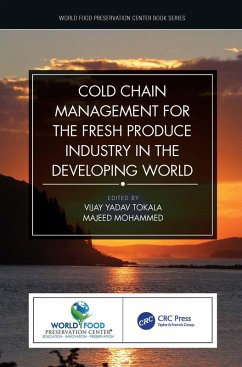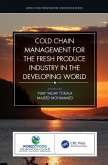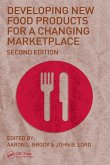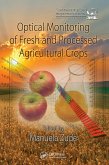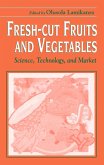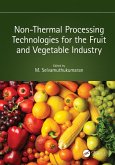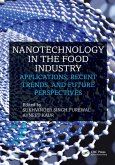Cold Chain Management for the Fresh Produce Industry in the Developing World (eBook, ePUB)
Redaktion: Tokala, Vijay Yadav; Mohammed, Majeed
70,95 €
70,95 €
inkl. MwSt.
Sofort per Download lieferbar

35 °P sammeln
70,95 €
Als Download kaufen

70,95 €
inkl. MwSt.
Sofort per Download lieferbar

35 °P sammeln
Jetzt verschenken
Alle Infos zum eBook verschenken
70,95 €
inkl. MwSt.
Sofort per Download lieferbar
Alle Infos zum eBook verschenken

35 °P sammeln
Cold Chain Management for the Fresh Produce Industry in the Developing World (eBook, ePUB)
Redaktion: Tokala, Vijay Yadav; Mohammed, Majeed
- Format: ePub
- Merkliste
- Auf die Merkliste
- Bewerten Bewerten
- Teilen
- Produkt teilen
- Produkterinnerung
- Produkterinnerung

Bitte loggen Sie sich zunächst in Ihr Kundenkonto ein oder registrieren Sie sich bei
bücher.de, um das eBook-Abo tolino select nutzen zu können.
Hier können Sie sich einloggen
Hier können Sie sich einloggen
Sie sind bereits eingeloggt. Klicken Sie auf 2. tolino select Abo, um fortzufahren.

Bitte loggen Sie sich zunächst in Ihr Kundenkonto ein oder registrieren Sie sich bei bücher.de, um das eBook-Abo tolino select nutzen zu können.
This book provides a comprehensive review of the benefits of an unbroken cold chain in developing countries and focuses on the critical role of extension education in the implementation of cold chain management.
- Geräte: eReader
- ohne Kopierschutz
- eBook Hilfe
- Größe: 14.89MB
Andere Kunden interessierten sich auch für
![Cold Chain Management for the Fresh Produce Industry in the Developing World (eBook, PDF) Cold Chain Management for the Fresh Produce Industry in the Developing World (eBook, PDF)]() Cold Chain Management for the Fresh Produce Industry in the Developing World (eBook, PDF)70,95 €
Cold Chain Management for the Fresh Produce Industry in the Developing World (eBook, PDF)70,95 €![Developing New Food Products for a Changing Marketplace (eBook, ePUB) Developing New Food Products for a Changing Marketplace (eBook, ePUB)]() Developing New Food Products for a Changing Marketplace (eBook, ePUB)115,95 €
Developing New Food Products for a Changing Marketplace (eBook, ePUB)115,95 €![Optical Monitoring of Fresh and Processed Agricultural Crops (eBook, ePUB) Optical Monitoring of Fresh and Processed Agricultural Crops (eBook, ePUB)]() Optical Monitoring of Fresh and Processed Agricultural Crops (eBook, ePUB)227,95 €
Optical Monitoring of Fresh and Processed Agricultural Crops (eBook, ePUB)227,95 €![Produce Degradation (eBook, ePUB) Produce Degradation (eBook, ePUB)]() Produce Degradation (eBook, ePUB)290,95 €
Produce Degradation (eBook, ePUB)290,95 €![Fresh-Cut Fruits and Vegetables (eBook, ePUB) Fresh-Cut Fruits and Vegetables (eBook, ePUB)]() Fresh-Cut Fruits and Vegetables (eBook, ePUB)261,95 €
Fresh-Cut Fruits and Vegetables (eBook, ePUB)261,95 €![Non-Thermal Processing Technologies for the Fruit and Vegetable Industry (eBook, ePUB) Non-Thermal Processing Technologies for the Fruit and Vegetable Industry (eBook, ePUB)]() Non-Thermal Processing Technologies for the Fruit and Vegetable Industry (eBook, ePUB)67,95 €
Non-Thermal Processing Technologies for the Fruit and Vegetable Industry (eBook, ePUB)67,95 €![Nanotechnology in the Food Industry (eBook, ePUB) Nanotechnology in the Food Industry (eBook, ePUB)]() Nanotechnology in the Food Industry (eBook, ePUB)177,95 €
Nanotechnology in the Food Industry (eBook, ePUB)177,95 €-
-
-
This book provides a comprehensive review of the benefits of an unbroken cold chain in developing countries and focuses on the critical role of extension education in the implementation of cold chain management.
Dieser Download kann aus rechtlichen Gründen nur mit Rechnungsadresse in A, B, BG, CY, CZ, D, DK, EW, E, FIN, F, GR, HR, H, IRL, I, LT, L, LR, M, NL, PL, P, R, S, SLO, SK ausgeliefert werden.
Produktdetails
- Produktdetails
- Verlag: Taylor & Francis
- Seitenzahl: 268
- Erscheinungstermin: 29. November 2021
- Englisch
- ISBN-13: 9781000474008
- Artikelnr.: 62733016
- Verlag: Taylor & Francis
- Seitenzahl: 268
- Erscheinungstermin: 29. November 2021
- Englisch
- ISBN-13: 9781000474008
- Artikelnr.: 62733016
- Herstellerkennzeichnung Die Herstellerinformationen sind derzeit nicht verfügbar.
Vijay Yadav Tokala did his PhD (Environment and Agriculture) with specialization in postharvest physiology at Curtin University, Perth, Western Australia. He studied the effect of two newly discovered ethylene antagonist compounds and 1-methylcyclopropene in the fruit crops, to extend storage life under different storage environments. He won a highly competitive "2016 - International Postgraduate Research Scholarship (IPRS)" and "Australian Postgraduate Award (APA)" through a merit-based international competition to pursue his PhD. Vijay completed his graduation with Horticulture as specialization from Dr Y.S.R. Horticultural University, Andhra Pradesh (India) and was the top scorer in the college (88.94 %). His postgraduate research was on fruit and vegetable processing and was awarded 'University Gold Medal' for being the top scorer in university (87.60 %) at S.K. Rajasthan Agricultural University, Rajasthan (India). Vijay is currently employed at Amity University as Assistant Professor, since January 2020. Previously, Vijay held the position of Research Scholar; Teaching Assistant for 4 years (March 2016 - October 2019), while working at Curtin University, Australia. Before this, he worked as 'Horticulture Officer' in the Government of Andhra Pradesh (India) for 15 months (November 2013 - February 2015) with duties as a field consultant and extension officer in both rural and urban areas, with the main job objective to enhance quality horticulture production. He is also voluntarily serving as President-Elect/ Board of Director for 'The Postharvest Education Foundation, a US-based non-profit organization committed to reducing global postharvest losses by providing innovative training programs to participants from more than 30 different developing nations. He is well-versed and experienced in the production and postharvest aspects of horticulture crops of different climatic zones. He has edited two books on postharvest capacity building, published more than 25 research papers in peer-reviewed journals and presented papers at several national and international platforms. His previous international consultation experience includes desktop studies and coordination with local teams for postharvest management of horticulture crops in Ethiopia, Nepal, Rwanda and Senegal. He also regularly participates in online technical discussions, related to postharvest management of horticulture crops, sustainable agriculture, food loss and waste reduction etc. through social networking sites and blogs. Majeed Mohammed is a Professor of Postharvest Physiology at the University of The West Indies UWI), with 31 years of experience in teaching, research and outreach activities. He earned his Ph.D. in Postharvest Physiology at The UWI, M.Sc. in Postharvest Physiology at the University of Guelph and B.Sc. in Agriculture at The UWI. His research is centered on the physiology and biochemistry of ripening of tropical fruits, effects of ethylene antagonists in delaying senescence of cut-flowers, alleviation of physiological disorders of minimally processed fruits and vegetables and cold chain management and development of value-added food products. He has developed four schools of research: one in Postharvest Physiology; another in Commodity Utilisation; the third in Food Quality Management and the fourth in Postharvest Extension. His latest work focuses on assisting Caribbean countries with developing sustainable, efficient and inclusive mechanisms to produce, transform and deliver healthy and safe food to consumers. He is currently a Board Director with the Postharvest Education Foundation (PEF), USA and a member of the UN/FAO Panel of Experts from Latin America and the Caribbean on the Prevention and Reduction of Food Losses and Waste.
Contents
Foreword...........................................................................................................................................vii
Preface...............................................................................................................................................ix
Editors................................................................................................................................................xi
Contributors....................................................................................................................................
xiii
Section I Cooling and Cold Chain
Chapter 1 Cold Chain and Its Importance-Current Global
Status..............................................3
Lisa Kitinoja, Vijay Yadav Tokala, Majeed Mohammed, and
Bal Vipin Chander Mahajan
Chapter 2 Cooling Requirements of Selected Perishable Crops During
Storage........................ 19
Puran Bridgemohan, Majeed Mohammed, and Vijay Yadav Tokala
Section II Cooling Systems
Chapter 3 Traditional/Conventional Cooling
Systems................................................................ 33
Swarajya Laxmi Nayak, R.R. Sharma, and Shruti Sethi
Chapter 4 Improved Small- Scale Cooling
Systems.....................................................................
45
Lisa Kitinoja and Charles Wilson
Chapter 5 Sustainable Cold Chain
Development.........................................................................
55
Toby Peters and Leyla Sayin
Chapter 6 The Container Mini Packhouse: Affordable and Effective Facility
for Sorting,
Packaging, and Storage of Fresh Produce for Small-/Medium-Scale
Farmers..........69
Ramadhani O. Majubwa, Theodosy J. Msogoya, Hosea D. Mtui,
Eleni Pliakoni, Steven A. Sargent, and Angelos Deltsidis
Chapter 7 Clean Cold Chain
Technologies..................................................................................85
Deirdre Holcroft, Wynand Groenewald, and Vijay Yadav Tokala
Chapter 8 Refrigerated Transportation in Marine Containers and Cold Chain
Transport
Logistics......................................................................................................99
Eduardo Kerbel
Section III ¿C old Chain Development, Capacity
Building and Case Studies
Chapter 9 Capacity Building for Cold Chain
Development...................................................... 119
Amanda Brondy, Lowel Randell, and Madison Jaco
Chapter 10 Historical Perspectives on the Cold-chain in
India................................................... 133
Pawanexh Kohli
Chapter 11 Progress and Status of Cold-chain in
India............................................................... 147
Pawanexh Kohli
Chapter 12 Cold Chain Operations in the Caribbean: Opportunities and
Challenges................ 165
Puran Bridgemohan and Majeed Mohammed
Chapter 13 Solar-Powered Cold Storage: ColdHubs in
Nigeria.................................................. 175
Olubukola M. Odeyemi and Nnaemeka C. Ikegwuonu
Chapter 14 Low-Cost Cooling Technology to Reduce Postharvest Losses in
Horticulture Sectors of Rwanda and Burkina
Faso................................................... 183
Eric Verploegen, Mandeep Sharma, Rashmi Ekka, and Gurbinder Gill
Chapter 15 CoolBot(TM) Cool Rooms for Small-Scale Value Chain
Systems............................... 211
Neeru Dubey
Chapter 16 Policy, Strategies, Investments and Action Plans for Cold Chain
Development...... 219
Lisa Kitinoja and Divine Njie
Chapter 17 Gaps in the Research on Cooling Interventions for Perishable
Crops in Sub-
Saharan Africa and South
Asia.........................................................................
231
Lisa Kitinoja and Deirdre Holcroft
Chapter 18 Summary and
Conclusions........................................................................................245
Vijay Yadav Tokala and Majeed Mohammed
Index...............................................................................................................................................249
Foreword...........................................................................................................................................vii
Preface...............................................................................................................................................ix
Editors................................................................................................................................................xi
Contributors....................................................................................................................................
xiii
Section I Cooling and Cold Chain
Chapter 1 Cold Chain and Its Importance-Current Global
Status..............................................3
Lisa Kitinoja, Vijay Yadav Tokala, Majeed Mohammed, and
Bal Vipin Chander Mahajan
Chapter 2 Cooling Requirements of Selected Perishable Crops During
Storage........................ 19
Puran Bridgemohan, Majeed Mohammed, and Vijay Yadav Tokala
Section II Cooling Systems
Chapter 3 Traditional/Conventional Cooling
Systems................................................................ 33
Swarajya Laxmi Nayak, R.R. Sharma, and Shruti Sethi
Chapter 4 Improved Small- Scale Cooling
Systems.....................................................................
45
Lisa Kitinoja and Charles Wilson
Chapter 5 Sustainable Cold Chain
Development.........................................................................
55
Toby Peters and Leyla Sayin
Chapter 6 The Container Mini Packhouse: Affordable and Effective Facility
for Sorting,
Packaging, and Storage of Fresh Produce for Small-/Medium-Scale
Farmers..........69
Ramadhani O. Majubwa, Theodosy J. Msogoya, Hosea D. Mtui,
Eleni Pliakoni, Steven A. Sargent, and Angelos Deltsidis
Chapter 7 Clean Cold Chain
Technologies..................................................................................85
Deirdre Holcroft, Wynand Groenewald, and Vijay Yadav Tokala
Chapter 8 Refrigerated Transportation in Marine Containers and Cold Chain
Transport
Logistics......................................................................................................99
Eduardo Kerbel
Section III ¿C old Chain Development, Capacity
Building and Case Studies
Chapter 9 Capacity Building for Cold Chain
Development...................................................... 119
Amanda Brondy, Lowel Randell, and Madison Jaco
Chapter 10 Historical Perspectives on the Cold-chain in
India................................................... 133
Pawanexh Kohli
Chapter 11 Progress and Status of Cold-chain in
India............................................................... 147
Pawanexh Kohli
Chapter 12 Cold Chain Operations in the Caribbean: Opportunities and
Challenges................ 165
Puran Bridgemohan and Majeed Mohammed
Chapter 13 Solar-Powered Cold Storage: ColdHubs in
Nigeria.................................................. 175
Olubukola M. Odeyemi and Nnaemeka C. Ikegwuonu
Chapter 14 Low-Cost Cooling Technology to Reduce Postharvest Losses in
Horticulture Sectors of Rwanda and Burkina
Faso................................................... 183
Eric Verploegen, Mandeep Sharma, Rashmi Ekka, and Gurbinder Gill
Chapter 15 CoolBot(TM) Cool Rooms for Small-Scale Value Chain
Systems............................... 211
Neeru Dubey
Chapter 16 Policy, Strategies, Investments and Action Plans for Cold Chain
Development...... 219
Lisa Kitinoja and Divine Njie
Chapter 17 Gaps in the Research on Cooling Interventions for Perishable
Crops in Sub-
Saharan Africa and South
Asia.........................................................................
231
Lisa Kitinoja and Deirdre Holcroft
Chapter 18 Summary and
Conclusions........................................................................................245
Vijay Yadav Tokala and Majeed Mohammed
Index...............................................................................................................................................249
Contents
Foreword...........................................................................................................................................vii
Preface...............................................................................................................................................ix
Editors................................................................................................................................................xi
Contributors....................................................................................................................................
xiii
Section I Cooling and Cold Chain
Chapter 1 Cold Chain and Its Importance-Current Global
Status..............................................3
Lisa Kitinoja, Vijay Yadav Tokala, Majeed Mohammed, and
Bal Vipin Chander Mahajan
Chapter 2 Cooling Requirements of Selected Perishable Crops During
Storage........................ 19
Puran Bridgemohan, Majeed Mohammed, and Vijay Yadav Tokala
Section II Cooling Systems
Chapter 3 Traditional/Conventional Cooling
Systems................................................................ 33
Swarajya Laxmi Nayak, R.R. Sharma, and Shruti Sethi
Chapter 4 Improved Small- Scale Cooling
Systems.....................................................................
45
Lisa Kitinoja and Charles Wilson
Chapter 5 Sustainable Cold Chain
Development.........................................................................
55
Toby Peters and Leyla Sayin
Chapter 6 The Container Mini Packhouse: Affordable and Effective Facility
for Sorting,
Packaging, and Storage of Fresh Produce for Small-/Medium-Scale
Farmers..........69
Ramadhani O. Majubwa, Theodosy J. Msogoya, Hosea D. Mtui,
Eleni Pliakoni, Steven A. Sargent, and Angelos Deltsidis
Chapter 7 Clean Cold Chain
Technologies..................................................................................85
Deirdre Holcroft, Wynand Groenewald, and Vijay Yadav Tokala
Chapter 8 Refrigerated Transportation in Marine Containers and Cold Chain
Transport
Logistics......................................................................................................99
Eduardo Kerbel
Section III ¿C old Chain Development, Capacity
Building and Case Studies
Chapter 9 Capacity Building for Cold Chain
Development...................................................... 119
Amanda Brondy, Lowel Randell, and Madison Jaco
Chapter 10 Historical Perspectives on the Cold-chain in
India................................................... 133
Pawanexh Kohli
Chapter 11 Progress and Status of Cold-chain in
India............................................................... 147
Pawanexh Kohli
Chapter 12 Cold Chain Operations in the Caribbean: Opportunities and
Challenges................ 165
Puran Bridgemohan and Majeed Mohammed
Chapter 13 Solar-Powered Cold Storage: ColdHubs in
Nigeria.................................................. 175
Olubukola M. Odeyemi and Nnaemeka C. Ikegwuonu
Chapter 14 Low-Cost Cooling Technology to Reduce Postharvest Losses in
Horticulture Sectors of Rwanda and Burkina
Faso................................................... 183
Eric Verploegen, Mandeep Sharma, Rashmi Ekka, and Gurbinder Gill
Chapter 15 CoolBot(TM) Cool Rooms for Small-Scale Value Chain
Systems............................... 211
Neeru Dubey
Chapter 16 Policy, Strategies, Investments and Action Plans for Cold Chain
Development...... 219
Lisa Kitinoja and Divine Njie
Chapter 17 Gaps in the Research on Cooling Interventions for Perishable
Crops in Sub-
Saharan Africa and South
Asia.........................................................................
231
Lisa Kitinoja and Deirdre Holcroft
Chapter 18 Summary and
Conclusions........................................................................................245
Vijay Yadav Tokala and Majeed Mohammed
Index...............................................................................................................................................249
Foreword...........................................................................................................................................vii
Preface...............................................................................................................................................ix
Editors................................................................................................................................................xi
Contributors....................................................................................................................................
xiii
Section I Cooling and Cold Chain
Chapter 1 Cold Chain and Its Importance-Current Global
Status..............................................3
Lisa Kitinoja, Vijay Yadav Tokala, Majeed Mohammed, and
Bal Vipin Chander Mahajan
Chapter 2 Cooling Requirements of Selected Perishable Crops During
Storage........................ 19
Puran Bridgemohan, Majeed Mohammed, and Vijay Yadav Tokala
Section II Cooling Systems
Chapter 3 Traditional/Conventional Cooling
Systems................................................................ 33
Swarajya Laxmi Nayak, R.R. Sharma, and Shruti Sethi
Chapter 4 Improved Small- Scale Cooling
Systems.....................................................................
45
Lisa Kitinoja and Charles Wilson
Chapter 5 Sustainable Cold Chain
Development.........................................................................
55
Toby Peters and Leyla Sayin
Chapter 6 The Container Mini Packhouse: Affordable and Effective Facility
for Sorting,
Packaging, and Storage of Fresh Produce for Small-/Medium-Scale
Farmers..........69
Ramadhani O. Majubwa, Theodosy J. Msogoya, Hosea D. Mtui,
Eleni Pliakoni, Steven A. Sargent, and Angelos Deltsidis
Chapter 7 Clean Cold Chain
Technologies..................................................................................85
Deirdre Holcroft, Wynand Groenewald, and Vijay Yadav Tokala
Chapter 8 Refrigerated Transportation in Marine Containers and Cold Chain
Transport
Logistics......................................................................................................99
Eduardo Kerbel
Section III ¿C old Chain Development, Capacity
Building and Case Studies
Chapter 9 Capacity Building for Cold Chain
Development...................................................... 119
Amanda Brondy, Lowel Randell, and Madison Jaco
Chapter 10 Historical Perspectives on the Cold-chain in
India................................................... 133
Pawanexh Kohli
Chapter 11 Progress and Status of Cold-chain in
India............................................................... 147
Pawanexh Kohli
Chapter 12 Cold Chain Operations in the Caribbean: Opportunities and
Challenges................ 165
Puran Bridgemohan and Majeed Mohammed
Chapter 13 Solar-Powered Cold Storage: ColdHubs in
Nigeria.................................................. 175
Olubukola M. Odeyemi and Nnaemeka C. Ikegwuonu
Chapter 14 Low-Cost Cooling Technology to Reduce Postharvest Losses in
Horticulture Sectors of Rwanda and Burkina
Faso................................................... 183
Eric Verploegen, Mandeep Sharma, Rashmi Ekka, and Gurbinder Gill
Chapter 15 CoolBot(TM) Cool Rooms for Small-Scale Value Chain
Systems............................... 211
Neeru Dubey
Chapter 16 Policy, Strategies, Investments and Action Plans for Cold Chain
Development...... 219
Lisa Kitinoja and Divine Njie
Chapter 17 Gaps in the Research on Cooling Interventions for Perishable
Crops in Sub-
Saharan Africa and South
Asia.........................................................................
231
Lisa Kitinoja and Deirdre Holcroft
Chapter 18 Summary and
Conclusions........................................................................................245
Vijay Yadav Tokala and Majeed Mohammed
Index...............................................................................................................................................249
